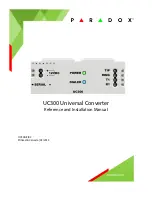
2. Serial Protocols
ROS® v3.11User Guide
43
RMC30
2. Serial Protocols
RuggedCom devices support the following serial protocols:
• Raw Socket serial encapsulation
• Preemptive Raw Socket
• TCPModbus (client and server modes)
• DNP 3
• DNP packetization over Raw Socket
• Microlok
• WIN and TIN
• Mirrored Bits
• TelnetComPort (RFC2217)
2.1. Serial Protocols Overview
Serial interface bit rates can be configured in range of 100 to 230400 bps. A "turnaround"
time is supported to enforce minimum times between successive messages transmitted via
a serial port.
If a port is set to force half-duplex mode, while sending data, all received data will be discarded.
To set this mode, the port must natively work in full-duplex mode.
To transport protocol messages through the network, either TCP/IP or UDP/IP transport can
be used. The exception is the TCPModbus protocol, which cannot be employed over UDP.
The setting of Differentiated Services Code Point (DSCP) in the IP header is provided for TCP/
IP and UDP/IP transport in the egress direction only.
Debugging facilities include statistics and tracing information on a serial port and/or network
transport.
2.1.1. Raw Socket protocol features
• A means to transport streams of characters from one serial port, over an IP network to
another serial port.
• XON/XOFF flow control.
• Configurable local and remote IP port numbers per serial port.
• Many-to-many UDP transactions.
• TCP accept or request connection mode.
• Point-to-point TCP connection mode and a broadcast connection mode in which up to 64
remote servers may connect to a central server.
• Packetization and sending data on a specific packet size, a specific character, or upon a
timeout.
• Configurable “turnaround” time to enforce minimum time between messages sent out the
serial port.
2.1.2. DNP over Raw Socket protocol features
• Packetization and sending data per DNP 3 protocol specification.
















































